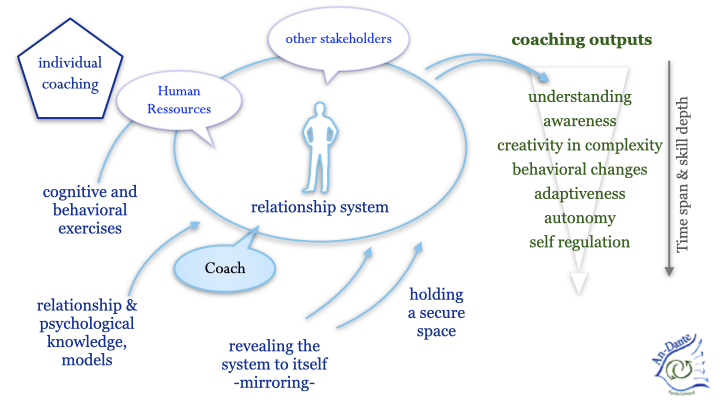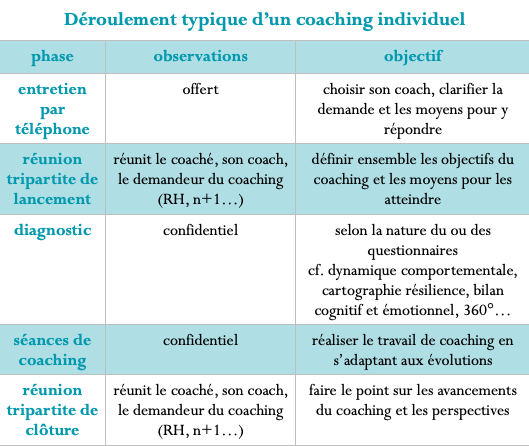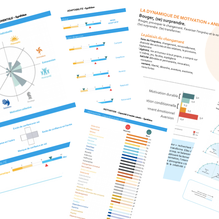Coaching Process
The coaching process is a response adapted to individual or collective needs to overcome difficulties and improve or streamline what already works well.
This process, based on the postulate of adaptive human intelligence, makes it possible to bring out the resources of the individual or group, faced with the situations or problems they encounter, and to find unique strategies for resolution. These strategies emanate from the individual or group concerned. Coaching is thus distinguished from a consulting approach, which provides and advises solutions supported by an audit and expertise of similar situations.Coaching also leads the individual or the system to develop his autonomy to resolve situations.
Coaching is based on the definition of coaching objectives, progress indicators and concrete action plans.The coach is responsible for the implementation of the means that will allow the individual or group to find and implement changes adapted to his problems. His neutral external perspective, his expertise of the company, crossed with that of the human and relational systems, allow him to accompany the individual and the collective in the transformation of his relationships.
Approach to coaching an individual in his environment
Individual coaching also takes into account the systemic elements of the individual – professional environment, personal environment, etc. – because no one is completely isolated. We are all part of complex relational systems, such as family, work or diverse communities. A system is a grouping of independent individuals, united by a common goal or collective identity.
ORSC Systemic Relational Coaching is an approach that considers individuals within relational systems, in a relationship of interdependence.Systems are like cobwebs, so when you touch a thread it impacts the whole web.Healthy systems are organized around encouraging, regulating and caring for the well-being of its members. These systems spontaneously tend to self-regulate, regenerate and evolve. They become all the more efficient when they become aware of their potential, understand their own functioning and align themselves with common interests.

The individual personally benefits from coaching
The coachee is accompanied in the deployment of his leadership, talents and creativity. During coaching sessions, coach and coachee shed light on the specificities of the coachee’s leadership style, in connection with his personality. Thus, the coachee develops a better knowledge of himself, his ability to adapt and creativity, his messages carry, his charisma develops. The coachee goes beyond the caps that seemed difficult or impassable, gains in ease and efficiency in his situations at stake, because he considers them with a different and distanced perception. Finally, a detailed understanding of personality dynamics allows him, for example, to anticipate, manage stress and conflicts and gain assertiveness, to embark his interlocutors with more ease.
The company also benefits from coaching
Coaching makes it possible to improve overall performance, to streamline professional relations, to better rely on the sustainable skills of each, to develop collective intelligence, to limit the costs and risks related to harmful relationships (sick leave, turnover, stress, decreased efficiency related to tensions and conflicts).
An-Dante coaching provides lasting benefits over time, as people acquire a better knowledge of their individual and collective resources, as well as the tools and operational exercises that allow them to be autonomous beyond the coaching period.
The effects of coaching are therefore short- and long-term, both for the individual and for the systems in which he works (company, networks, etc.).
Typical phasing of a coaching session
Here is the summary of the typical course of individual coaching.
However, the design of the course and the work are tailor-made.
Link to more details

Behavioural Dynamics Profile
